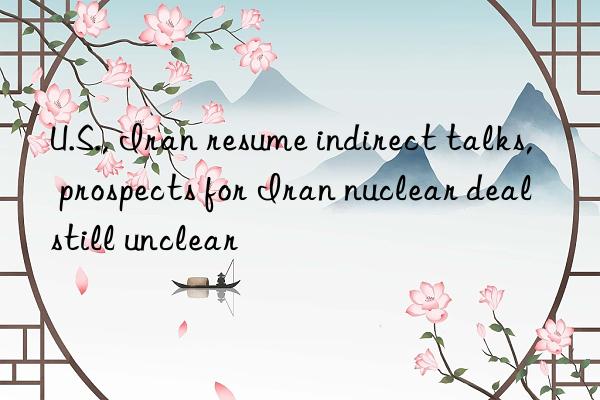
Xinhua News Agency, Tehran, June 29 (International Observer) The prospect of the US-Iran resumption of indirect negotiations on the Iran nuclear deal remains unclear
Xinhua News Agency reporter Gao Wencheng
Under the coordination of the European Union, Iran and the United States began indirect negotiations on the resumption of the implementation of the comprehensive agreement on the Iranian nuclear issue in Doha, the capital of Qatar, on the 28th, giving impetus to the negotiations that have been shelved for more than three months.
Analysts believe that the restart of the negotiations shows that the United States and Iran still have a strong willingness to return to the Iran nuclear deal, but there are still factors that hinder the negotiation.
Reboot in situ
Since April last year, parties to the Iran nuclear deal have held eight rounds of negotiations in Vienna, the capital of Austria. Negotiations once progressed to the point where it was considered to be only "one step" away from reaching an agreement, but finally reached a stalemate in March this year due to excessive differences between the United States and Iran. On June 8, the Board of Governors of the International Atomic Energy Agency passed a draft resolution drafted by the United States and other countries, accusing Iran of lacking cooperation with the agency. Iran responded by installing advanced centrifuges and shutting down some of the surveillance equipment operated by the International Atomic Energy Agency at Iran's nuclear facilities. This adds further uncertainty to the prospect of resuming compliance with the Iran nuclear deal.
On June 25, Borrell, the EU's high representative for foreign affairs and security policy, and Iranian Foreign Minister Abdullahyan, who visited Tehran, announced that negotiations to resume the implementation of the treaty will resume within a few days. Borrell said the negotiating venue would be in "a Gulf country" and the reason for changing the negotiation venue was because of the change in the negotiation format, with only Iran, the United States and the European Union participating.
The Iranian Foreign Ministry confirmed on the 27th that the negotiation venue is Doha. Mohammad Marandi, an adviser to Iran's negotiating team, said Iran chose Qatar as the venue for negotiations because Qatar is a "friendly country".
Practical considerations
Analysts believe that the willingness of Iran and the United States to resume negotiations, as well as the active mediation of the EU, are the result of the three parties considering their own interests.
From the perspective of the United States, the Biden administration needs to withdraw from the Middle East as soon as possible in order to concentrate on "great power competition". Despite showing pessimism about the resumption of the Iran nuclear deal from time to time, the Biden administration has always expressed its commitment to returning to the Iran nuclear deal, believing that this is the best way to resolve the Iranian nuclear issue.
At the same time, the United States is also worried that the prolonged negotiations will create more uncertainty. US media quoted US intelligence assessments as saying the "breakthrough time" for Iran to accumulate enough highly enriched uranium to fuel its nuclear weapons has been shortened from about a year to just a few weeks.
From the perspective of Iran, Iran's economy is facing problems such as high inflation and currency devaluation. To get out of the predicament, it is necessary to lift the US sanctions against Iran through negotiation.
In addition, Alex Watanka, director of the Iran Program at the US think tank Middle East Institute, believes that the US will hold congressional midterm elections in November, and the Democratic Party is expected to lose its congressional seats in the elections, so Tehran may hope that before the elections Make a deal with the Biden administration. The high international oil price and the lack of spare capacity also make Iran, a major oil-producing country, see the opportunity to promote the lifting of economic sanctions.
As to why the EU actively promotes the resumption of negotiations between the United States and Iran, Fan Hongda, a professor at the Middle East Institute of Shanghai International Studies University, believes that one of the important motivations is to ease the tension in the energy market. At present, Europe is caught in the predicament of insufficient energy supply and soaring energy prices. The energy problem will become more prominent after the weather turns cold. Some analysts believe that if the United States lifts sanctions against Iran, Iran can provide 1.2 million barrels more oil per day to the international market.
The future is unclear
Although the United States and Iran both have the willingness to negotiate, it is difficult to predict whether the two sides can reach an agreement through negotiations.
The Islamic Republic of Iran News Agency pointed out in an analysis article a few days ago that there are still key obstacles to returning to the Iran nuclear deal. One of them is that the Iranian leadership is worried that it will be deceived again because the former US administration withdrew from the Iran nuclear deal. Some voices believe that if the Republican Party of the United States returns to power after the 2024 election, it will likely withdraw from the Iran nuclear deal again. At that time, the economic impact of Iran from being re-sanctioned will be greater than the short-term benefits obtained by reaching an agreement with the Biden administration. In addition, tensions between Iran and Israel and other countries may also affect the negotiations, and some hostile forces in Iran may increase sabotage activities to prevent the United States and Iran from returning to the implementation of the Iran nuclear agreement.
For this round of negotiations, Ali Vaez, an expert on Iran at the International Crisis Research Group, a think tank based in Brussels, Belgium, predicted that both the United States and Iran may be more inclined to stick to their respective positions rather than make substantial compromises. In view of the fact that the differences between the United States and Iran that led to the stalling of the previous negotiations still exist, both sides are more cautious about the prospects of the negotiations.
The Washington Post reported that a U.S. official said: "We will not prejudge (the outcome of the negotiations), but we will strictly control our expectations." The Iranian Foreign Ministry stated that Borrell had already visited Iran recently. The U.S. side has conveyed the opinion of the U.S. side to the Iranian side. The U.S. side has promised to abide by the Iran nuclear deal and UN Security Council Resolution 2231, and to safeguard Iran’s economic interests. But given that the United States has withdrawn from the Iran nuclear deal, it remains to be seen whether Washington will deliver on its promises.


